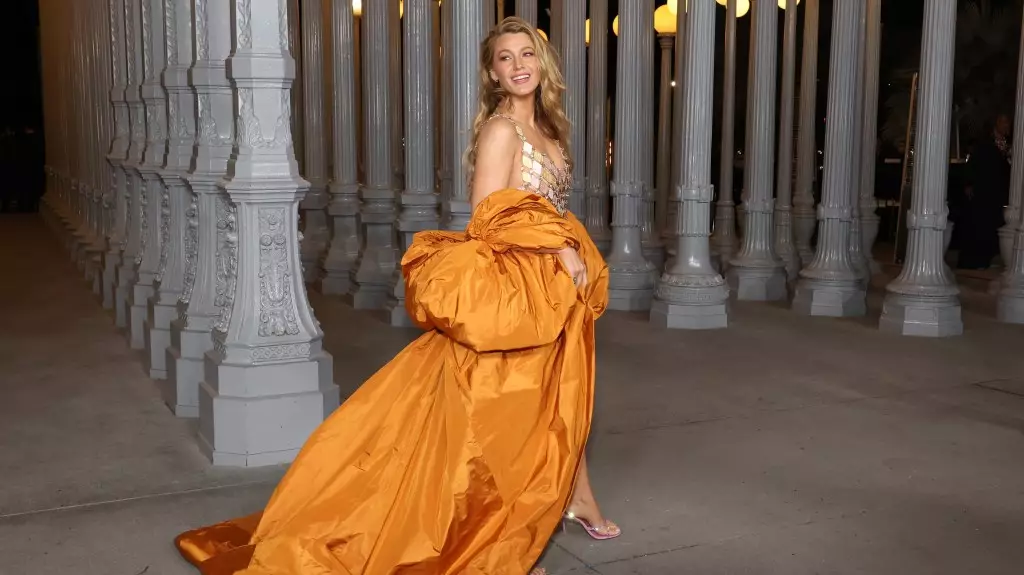The entertainment industry is no stranger to scandals, but the recent allegations made by actress Blake Lively against her co-star, Justin Baldoni, are shaking its very foundation. Filed with the California Civil Rights Department, Lively’s lawsuit encapsulates claims of sexual harassment and retaliatory tactics that have reverberated throughout both her personal and professional life. The magnitude of these allegations raises critical discussions on workplace conduct, especially within Hollywood’s tightly-knit community.
According to the lawsuit, the professional repercussions for Lively were both swift and severe. Not only did she feel compelled to cancel a crucial appearance as the host for the Season 50 premiere of Saturday Night Live, but the situation also led to her withdrawal from a key event for her haircare brand in collaboration with Target. In her complaint, Lively detailed how pervasive negative chatter surrounding filming led to feelings of insecurity regarding public appearances, fanning the flames of her already strained situation. The pressure upon Lively, who was gearing up to celebrate a significant milestone in her career, is indicative of how deeply women’s professional trajectories can be affected by allegations against their male colleagues.
The implications for Lively are multi-faceted. Citing that the decision to back out of public engagements stemmed from a fear of potential scrutiny and forced discussions about her experiences on set, the lawsuit underscores the backstage dynamics that often go unnoticed. For a prominent figure in Hollywood, the inability to participate in high-visibility projects signifies not only personal loss but a broader commentary on the infringement of one’s rights and representation in the industry.
The Allegations: A Detailed Account of Workplace Misconduct
The lawsuit portrays Baldoni’s alleged conduct as not merely inappropriate but as a chilling reminder of how unchecked power can lead to a toxic work environment. It describes an “all-hands meeting” wherein Lively, her husband Ryan Reynolds, and Baldoni engaged in a conversation that aimed to address Baldoni’s purported “disturbing behavior.” The allegations range from unsanctioned additions of intimate scenes to unsettling remarks about Lively’s family. Such behaviors, as described, paint a troubling portrait of what can transpire when individual boundaries are disregarded, especially in an industry that often idolizes its male figures.
Lively’s experience speaks volumes about the complex layers of trauma and discomfort that professionals, particularly women, may endure. By shedding light on her experience, she provides a platform for dialogue surrounding safety, respect, and the responsibilities of those in power to uphold professionalism in a creative setting.
Baldoni’s response, conveyed through his attorney, rejected Lively’s claims as “categorically false” and suggested that her actions were attempts to salvage her reputation following public reactions to her remarks during the promotion of the film. This counterargument indicates the deeply entrenched pattern of victim-blaming that often surfaces in such cases. Instead of addressing the alleged misconduct, the focus shifts to the accuser’s credibility, further complicating the already challenging landscape for victims of harassment.
Adding another layer to this narrative, Baldoni was reportedly dropped by his agency, WME, shortly after news of the lawsuit broke. This action indicates that the industry too recognizes the possible ramifications of maintaining an association with individuals embroiled in such allegations. Moreover, Colleen Hoover, the author of the novel that inspired the film, expressed her support for Lively, reinforcing the notion of solidarity among women in the industry.
The case of Blake Lively versus Justin Baldoni serves as a stark reminder about the continuous fight against harassment in the workplace, particularly in sectors where power dynamics are pronounced. It drives home the importance of creating environments where individuals feel empowered to speak out without fear of retaliation or reputational damage.
The aftermath of this lawsuit, whether it leads to legal ramifications for Baldoni or promotes industry-wide change, remains to be seen. What is clear, however, is that Lively’s bravery is a crucial step in challenging the status quo and initiating conversations that could lead to healthier work environments for current and future generations of actors and industry leaders. The fight against sexual harassment in Hollywood is far from over, but every voice counts, and Lively’s stands out as a clarion call for accountability and respect within the industry.


Leave a Reply